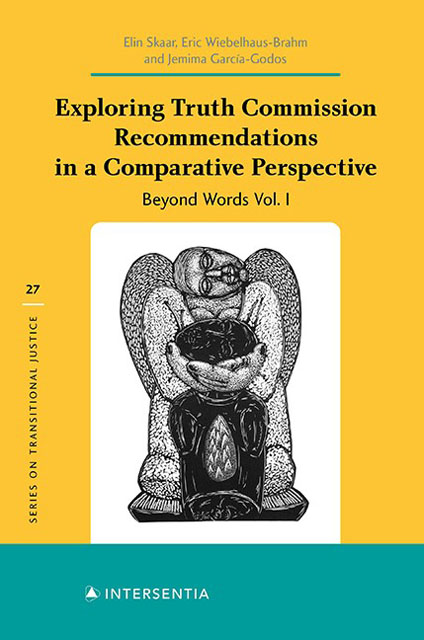Book contents
- Frontmatter
- Preface
- Contents
- List of Acronyms and Abbreviations
- List of Tables and Figures
- Chapter 1 Exploring Recommendations
- Chapter 2 Researching Recommendations
- Chapter 3 Counting and Classifying Recommendations
- Chapter 4 Formulating Recommendations
- Chapter 5 Case Studies of Implementation
- Chapter 6 A Cross-National Analysis of Implementation
- Chapter 7 Conclusions
- Appendix I Latin American truth Commission Reports
- Appendix II Information on 13 Latin American truth CommissionReports and their Recommendations
- Appendix III Excerpts from the truth Commission Recommendations Data Code Book
- Appendix IV Implementation of the Recommendations Made by 13 Latin American truth Commissions
- Appendix V Implementation Rates for Recommendations Made by 13 Latin American truth Commissions, by Category
- Appendix VI Overview of Commissioners of 12 Formal Latin American truth Commissions
- Appendix VII Latin American Countries Signatories to and Ratification of the International Convention for the Protection of All Persons from Enforced Disappearance (2006)
- Bibliography
- Index
- About the Authors
Chapter 1 - Exploring Recommendations
Published online by Cambridge University Press: 19 November 2022
- Frontmatter
- Preface
- Contents
- List of Acronyms and Abbreviations
- List of Tables and Figures
- Chapter 1 Exploring Recommendations
- Chapter 2 Researching Recommendations
- Chapter 3 Counting and Classifying Recommendations
- Chapter 4 Formulating Recommendations
- Chapter 5 Case Studies of Implementation
- Chapter 6 A Cross-National Analysis of Implementation
- Chapter 7 Conclusions
- Appendix I Latin American truth Commission Reports
- Appendix II Information on 13 Latin American truth CommissionReports and their Recommendations
- Appendix III Excerpts from the truth Commission Recommendations Data Code Book
- Appendix IV Implementation of the Recommendations Made by 13 Latin American truth Commissions
- Appendix V Implementation Rates for Recommendations Made by 13 Latin American truth Commissions, by Category
- Appendix VI Overview of Commissioners of 12 Formal Latin American truth Commissions
- Appendix VII Latin American Countries Signatories to and Ratification of the International Convention for the Protection of All Persons from Enforced Disappearance (2006)
- Bibliography
- Index
- About the Authors
Summary
Every people has the inalienable right to know the truth about past events concerning perpetration of heinous crimes and about the circumstances and reasons that led, through massive or systematic violations, to the perpetration of those crimes.
– Diane Orientlicher (UN Independent Expert)In recent decades, dozens of countries have established official truth commissions to investigate patterns of gross human rights violations committed by repressive regimes and/or in the context of armed conflict. Approximately a third of these commissions have been in Latin America, making it a leading region in this search for truth. Constructing shared memories of the past, many believe, is crucial to healing divided societies after violent conflict and repression. Apart from documenting abuses, most truth commissions make recommendations to governments, typically outlining further measures to address past abuses and/or to prevent such abuses from happening again. It is generally assumed that these recommendations, if implemented well, will prompt further measures to address past abuses such as compensating surviving victims and their families for past suffering, and promote the types of reforms that may aid societies in the transition from violence to peace, democracy, and reconciliation.
A significant comparative literature on truth commissions notwithstanding, to date, there is no systematic cross-national study of the formulation and implementation of truth commission recommendations. Hence, we know little about whether and under what conditions recommendations are more or less likely to be implemented. This knowledge gap has been increasingly recognized (United Nations General Assembly 2013). As the first United Nations (UN) Special Rapporteur on the promotion of truth , justice, reparation, and guarantees of non-recurrence , Pablo de Greiff, warned shortly after taking office in 2012, truth commissions around the world would “face various challenges which can lead to the non-implementation of recommendations. Among these challenges are overly broad mandates, flawed choices of commissioners, and insufficient and unreliable funding streams” (United Nations Office for the High Commissioner of Human Rights 2013).
In this book, we analyze the recommendations of 13 Latin American truth commissions established by 11 countries since 1983. Specifically, we address two main research issues: (i) What kinds of recommendations have Latin American truth commissions made, and why?; and (ii) How, when, and by whom have the recommendations been implemented? Through a comparative approach, we uncover the factors that shape the recommendations produced by truth commissions.
Information
- Type
- Chapter
- Information
- Exploring Truth Commission Recommendations in a Comparative Perspective: Beyond Words Vol 1 , pp. 1 - 24Publisher: IntersentiaPrint publication year: 2022
